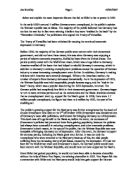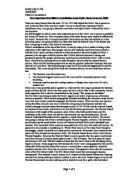Joe Buckley Page 10/05/2007
Select and explain the most important factors that led to Hitler’s rise to power in 1933
In the early 1930’s around 5 million Germans were unemployed, in the public’s opinion the Weimar republic was to blame. The majority of the public believed that Germany had not lost the war but in fact were winning it before they were “stabbed in the back” by the “November Criminals,” the politicians who signed the Treaty of Versailles.
The Treaty of Versailles had been criticised for causing the continual economic depression in Germany
Before 1929, the majority of the German public were content with their democratic government, and did not have these views; this was when Germany was enjoying a period of relative economic prosperity, fuelled by loans from the United States. The period quickly ended with the Wall Street crash, which was a huge blow to Germany. America recalled all the loans that had helped to rebuild Germany’s economy, which in addition to Germany’s existing unemployment problems caused the operation of German industry to cease increasing unemployment even further. In addition, Germany’s trading relations with America were severely damaged. Without the American market, the number of exports from Germany decreased dramatically. As in the depression of 1923, the Weimar Republic was held responsible, people became angry, and the “stab in the back” theory, which was a popular idea during the 1923 depression, returned. The German public had completely lost faith in their democratic government. Germans began to turn to more extreme parties such as the communists and the Nazis. Statistics showed that as unemployment went up, support for the Nazi’s grew. In 1928, there were 1.7 million people unemployed; the figure had risen to 6 million by 1932, the year of the enabling act.






